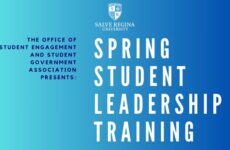By Emily Ferro –
We’ve all been there before-sitting in a class wondering “when am I ever going to need to know this?” Whether the work is busywork, or extremely relevant to the course, it sometimes just feels like the course is there to fill up four years in college. Throughout high school, “How is this useful?” was the question of the hour, and up until very recently, I was pretty convinced that the answer would be never. Class after class seemed to be separate and irrelevant to my day-to-day life. While some of it may have been interesting, I was missing the point.
This semester, something has shifted. Without any warning, every class seems to be assisting me in my understanding of what we are learning in another class. Within the first two weeks, I tended to shrug the instances off as coincidence. I stumbled across the same name in the reading for two different classes, or a teacher off-handedly mentioned a term which I had only just learned in the class before. The more frequent the occasions become, however, I am beginning to realize that what I am learning is relevant, and there has never been anything more comforting. With all of these experiences, the one that really proved to me that my classes were being molded into an education came in my early-morning Advertising class. With the simple mention of a name, my teacher sparked in me the realization of the year, and that name was Saussure. Ferdinand de Saussure was first introduced to me in my Literary Theory class in my sophomore year. He was a pioneer in theory and is one of the founders of semiotics, a way to analyze literature and texts through breaking down images into three parts: the idea, the object, and the word. Now you can imagine my surprise when his name was mentioned in advertising. What does semiotics have to do with ads? When learning about semiotics, we learned that it does not just study literature, but all texts, apparently including ads.
Again and again these situations are arising, a name here, a term there, and it all works in our benefit. I suppose this is why we’ve all chosen to go to a liberal arts school. We get a sampling of all kinds of material that could be useful in more than one context. It is what urges us to pursue to learn what we love. It is why my thesis topic can be based in literature and history, and why I can understand certain material more easily with the help of vocabulary learned in another class. We will not simply grow up to be Biology majors or Literature majors. We will grow up with knowledge outside of our major and it will make us wonderfully useful in the real world some day.
So maybe now and then you’ll find yourself in a class which you couldn’t possibly imagine using the information ever again. There are concepts which you don’t understand, or seem to outlandish to ever be relevant after college. Let’s look on the bright side, though. You’ll never know if you’ll need the knowledge for Jeopardy one day. “I’ll take ‘Stuff I Learned as an Undergrad for $300!”













